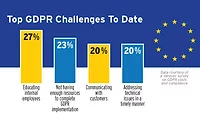How Low Retention Costs Enterprises
In at least one way the security industry mirrors the fast food business – the employee turnover rate is nearly 400 percent annually in both lines of work. So, for each position a security company’s HR department has to fill, they really have to recruit, train, outfit and deploy four people each year. Market forces virtually prohibit security firms from paying higher wages because the “investment” increases in direct proportion to the hours worked. If the added costs make your firm uncompetitive or unprofitable, the discussion of retention and morale is moot. Considering these factors, it may be time for sophisticated managers to discover clever ways of investing prized resources.
Many security firms budget between $300 and $400 for uniforms for each security officer they hire. At a 400 percent turnover rate, this amount can total $1,600 in gear that cannot be re-deployed and were not invested wisely to retain the talent that the HR department has spent thousands of dollars to screen and recruit. Since uniform costs also increase in direct proportion with hiring, it is vital that managers identify re-deployable equipment that helps with the retention of employees and simultaneously improves morale.
The Job Satisfaction Equation
When it comes to job satisfaction, employees look for fair pay, their perceived status by others, safety and personal satisfaction. Security company HR departments have undoubtedly done their homework to ensure the wages their companies pay are fair and in line with the market. So how does your front-line security staff feel about the rest of the satisfaction equation?
Do they feel safe, or are your security officers among the 56 percent who are armed with little to protect themselves? Are they provided professional-grade equipment that reflects their status and importance of their jobs? In an online survey of security officers on LinkedIn that asked what gear is carried on their post, the responses reveal an abundance of caution in allowing security staff to protect themselves from on-the-job risks of harm.
By giving serious consideration to the tools your company places on your officer’s duty belt you can address two key areas that affect your operating costs. Professional grade equipment, such as enhanced non-lethal (ENL) devices, can boost your front line staff’s self-perceptions and shift the general public’s interactions with your officers in a more favorable direction. With such tools, security officers can feel safe in their ability to do their job and be respected for doing it professionally.
The core benefits of ENL devices – which combine two or more non-lethal defenses with a communication platform – are that ENLs introduce very little personal risk to use and provide substantial benefit to the security officer as well as the company for which he or she works. Consider that the legal risks associated with poorly documented incidents virtually disappear thanks to ENL’s on-board cameras. The quantity of incidents is likely to decline when ENLs are used. Insurance companies prefer the use of non-lethal devices over firearms.
The benefit of investing in durable duty-belt equipment, such as ENLs, is that it can be shared between shifts and even be reassigned to new-hires in the event an employee leaves. So instead of spending up to $1,600 a year to dress security officers to fill a single position, security companies can invest $300 for an ENL device, which will make employees and reduce HR recruiting expenses across your headcount. Even an employee making $8 an hour can end up costing a company about $3,500 in direct and indirect turnover costs.
The process of deploying new equipment, such as ENL devices, requires planning and active participation from a security company’s training department. But the savings in operating costs you can realize is substantial and becomes even more so as the size of your security business increases.
When security officers feels appreciated and believe that their employers are investing to keep them well equipped something special happens, they walk more confidently, they show up on time, take pride in their work and in the end have greater job satisfaction and reduce the costly turnover that is all too common in the security industry.
Looking for a reprint of this article?
From high-res PDFs to custom plaques, order your copy today!






